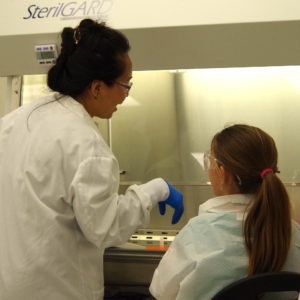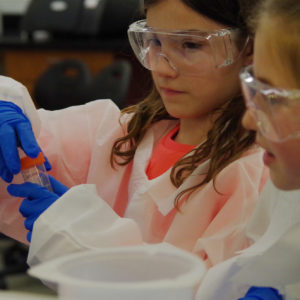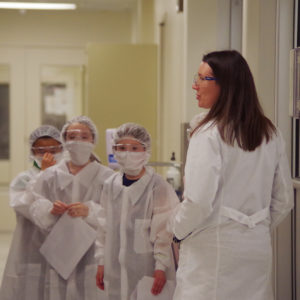
My twin daughters are finishing up their 10th-grade year next month, finding themselves smack in the middle of their high school experience, and discussions of classes, colleges and careers are increasing in frequency in my household. (It’s cliché, but I have to say it… Where does the time go?) As the girls begin to ponder their future, my husband and I are encouraging them to gain real-life insight from adults who work in fields they’re curious about. It’s never too early to get a first-hand perspective.
One of my girls has known from a pretty young age that she wants to pursue something in STEM, and likely the “S” in the acronym. Her schedule happened to be open the night a few months ago that one of my Promega colleagues, Senior R&D Scientist Danette Daniels, was speaking on a panel sponsored by the University of Wisconsin – Madison chapter of Graduate Women in Science. My daughter wasn’t sure about how she’d be received as the only high school student in the room, but she agreed to go with me anyway. Besides, I told her, they’re serving pie.
The six women on the panel represented a huge variety of avenues (academic to industry), specialties (biophysics to geology) and professional styles. During introductions, one panelist declared, “I had a job in a lab and was depressed. When I was stuck in a library all day, I was totally excited.” She now works with an organization to recruit more women into STEM fields. The woman sitting beside her runs a research lab and declared, “I love the bench quite a bit, and I don’t want to be in an office reading!”

They spoke of the importance of life balance and finding a career that resonates. They discussed recognizing personal as well as professional strengths, and paying attention to them. Danette, certainly a people person, shared her satisfaction in teaming with many partners to advance scientific goals, from working with scientists in a variety of situations to understand and address their struggles, to collaborating with academic and pharmaceutical partners to eventually publish together.
The scientists also shared insight into just how many doors a career in science can open, which are quite a few. Each of the panelists had also made a shift one way or another within their scientific careers. “You don’t always know what you will want to do, so leave enough room for change,” said one of the panelists. “Be open, and have the courage to take the chance. You can always change your mind.”
Danette added, “Everything evolves, even within the same position.”
It was these final points that resonated the most with my daughter. She told me later she was relieved to know that she could pursue science and have many opportunities to move around within it, reaffirming her instincts that STEM was right for her. This was an early insight I think she could have only gained by hearing it from those wise scientists on the panel that night.
It’s easy to underestimate the value of taking a couple of hours to share some career insight. But that can be all it takes to open a young person’s mind to new possibilities. That’s just what happened when Promega Global Product Manager Jenny Loeb recently took time to share her career journey with students in the Chemistry 184 course at the University of Wisconsin-Whitewater.
One student shared, “She showed us all the cool jobs that you can do with a science degree, and how you don’t always have to work in a lab.”
 It doesn’t take much to spark the flame. Generating excitement around STEM is meaningful for very young children as well. A few weeks ago, the scientists at Promega Madison’s Cell West facility hosted Girl Scout troop 7407. These young women were working on the newly introduced STEM badge for girl scouts. According to their troop leader, Lynn Lanning, several of these girls had asked for microscopes or chemistry sets for Christmas or birthdays, so when the Girl Scouts of America introduced 23 new STEM and outdoor badges, which marks the largest programming rollout in almost a decade, she reached out to Promega. The scientists at Cell West set up stations where the girls could discover what it means to take care of cells in culture, gown up and learn about working in a sterile environment, experiment with dry ice and liquid nitrogen to learn about pressure and temperature, and even try their hand at the lab bench with some pipetting and microscopy. Such programming builds girls’ skills and encourages their interest in STEM and environmental conservation from an early age, increasing their confidence in these areas—in an all-girl environment where they feel comfortable trying new things, taking appropriate risks, and learning from failure.
It doesn’t take much to spark the flame. Generating excitement around STEM is meaningful for very young children as well. A few weeks ago, the scientists at Promega Madison’s Cell West facility hosted Girl Scout troop 7407. These young women were working on the newly introduced STEM badge for girl scouts. According to their troop leader, Lynn Lanning, several of these girls had asked for microscopes or chemistry sets for Christmas or birthdays, so when the Girl Scouts of America introduced 23 new STEM and outdoor badges, which marks the largest programming rollout in almost a decade, she reached out to Promega. The scientists at Cell West set up stations where the girls could discover what it means to take care of cells in culture, gown up and learn about working in a sterile environment, experiment with dry ice and liquid nitrogen to learn about pressure and temperature, and even try their hand at the lab bench with some pipetting and microscopy. Such programming builds girls’ skills and encourages their interest in STEM and environmental conservation from an early age, increasing their confidence in these areas—in an all-girl environment where they feel comfortable trying new things, taking appropriate risks, and learning from failure.
And as a parent, I’m grateful to the adults, especially my Promega colleagues, who take the time to not only share their career insights, but also inspire the next generation of scientists. These scientists will of course help humanity, and make their moms and dads proud, too.
Latest posts by Karen Burkhartzmeyer (see all)
- Sustainability Day: It’s not just for the last Wednesday in October - October 26, 2022
- Adapting Holiday Traditions: COVID, Customs and Cookies at Promega - December 16, 2020
- Supporting Caregivers, Colleagues, and Neighbors - November 24, 2020
